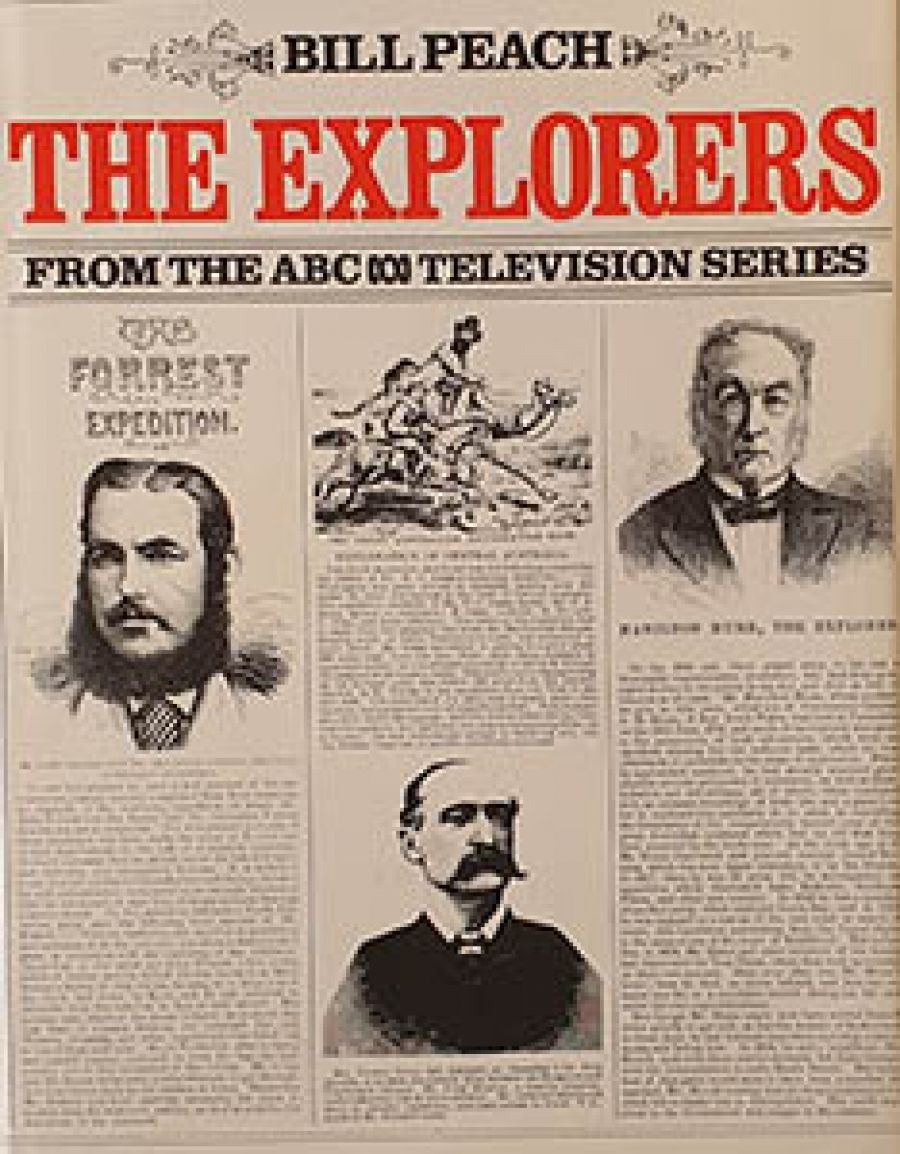
- Free Article: No
- Contents Category: Australian History
- Review Article: Yes
- Online Only: No
- Custom Highlight Text:
In Grade 5 social studies we ‘did’ Australia. After Captain Cook and the first fleet and settlement, and a couple of lessons spent drawing Aboriginal mia-mias and weaponry came the explorers. Blaxland, Wentworth and Lawson, Hume and Hovell, Major Mitchell, Burke and Wills Captain Sturt, and Edward John Eyre … Their names and achievements were committed to memory as surely as the three times table. But as our sticky hands traced maps from our atlases onto lunch wrap paper and into our exercise books – there to be outlined in accident-prone Indian ink, and the dotted lines of exploration marked – the explorers somehow failed to grasp our imaginations. We experienced little sympathy with their effort or their suffering, and only a mechanical recognition of the importance of their discoveries.
- Book 1 Title: The Explorers
- Book 1 Biblio: ABC Books, $19.95, 160 pp
Bill Peach’s book The Explorers based on the ABC TV series of the same name, challenges some of the attitudes on which this history teaching was based and makes clear why it was so unsatisfactory. Most importantly, it challenges the ‘great man’ approach to history which gave all the recognition to expedition leaders, ignoring the ‘unacknowledged explorers’, the convicts who accompanied the early exploring parties, did most of the hard work and risked, and ‘sometimes lost their lives, and the Aboriginal members of exploring parties whose skills in tracking, and finding water and wild food were vital to the success of several expeditions. Some of them showed extraordinary loyalty and courage, like Jacky Jacky the ‘strongest and most reliable member’ of Edmund Kennedy’s party who cared for his leader after he was fatally wounded by Aboriginal spears, and returned alone to report the fate of the expedition, and Wylie, who stayed loyal to Eyre after two other Aboriginals had killed one member of the party and deserted with the guns and most of the food.
By giving credit to convict and Aboriginal explorers, Bill Peach has highlighted some of the differences in attitude between the nineteenth century and our own time. It now seems absurd that the competent explorer George Evans was passed over as expedition leader because Earl Bathurst, Secretary of State for the Colonies, decided he was not a gentleman. But it is this kind of insight which establishes our sense of colonial attitudes, and gives immediacy to the accounts of exploration.
A strength of the book (and missing from our Grade 5 social studies) is the use of extracts from their diaries and journals to give the explorers’ daily experiences and impressions. We have Sturt’s description of his sufferings from scurvy, Giles’ record of the ‘variety of lovely flowers of every kind and colour’ in Palm Valley, Hovell’s shrewd assessment of central Victoria as ideal sheep country, Leichardt’s description of his companions round the campfire, and the menu for the Giles party’s Christmas dinner – wallaby chops, and a bottle of rum from ‘the medical department’. The result is close to that achieved by today’s oral histories – the sense of people telling, in their own words, history as they experienced it.
The Explorers has capitalised on its television origins, and is highly visual, with more than half of its space devoted to colour photographs of the country through which the explorers passed, contemporary sketches, portraits and newspaper cartoons. Great attention has been given to the placement of illustrative material, so that when we read from Oxley’s diary – ‘I was forced to come to the conclusion that the interior of this vast country is a marsh and uninhabitable’ – it is accompanied by a colour photograph of the marsh country on the Lachlan River which prevented Oxley from tracing the destination of the westward flowing rivers.
Our school study of the explorers saw their discoveries as individual achievements. This book, because it is organised in terms of the physical challenge presented by the continent, is successful in showing how those achievements contributed to gradually filling in the map outline of Australia completed by Flinders, and the importance of the rivers, mountains, grazing lands, and deserts they discovered.
By creating a strong sense of the life and attitudes of colonial Australia Peach has contrasted them sharply with our own. He asks the question – to what extent can the white explorers be said to have ‘discovered’ any natural feature, since the Aboriginals knew they were there, and had their own names for them? But the effect is not to denigrate the effort and achievement of the explorers, since the book establishes what we owe them for the maps we take for granted today. It is to strike a balance in our evaluation of their achievements somewhere between the hero status and glorification of the nineteenth century and more recent tendencies to see them as ‘clownish flag wavers’.


Comments powered by CComment